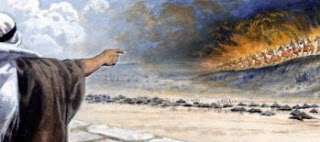As I read D&C 133:57-59, I asked my self what it means when it says that “two shall put their tens of thousands to flight”
57 And for this cause, that men might be made partakers of the glories which were to be revealed, the Lord sent forth the fulness of his gospel, his everlasting covenant, reasoning in plainness and simplicity—
58 To prepare the weak for those things which are coming on the earth, and for the Lord’s errand in the day when the weak shall confound the wise, and the little one become a strong nation, and two shall put their tens of thousands to flight.
59 And by the weak things of the earth the Lord shall thresh the nations by the power of his Spirit.
What does this passage of scripture refer to? Is this a specific event or a description of the Lord’s support of his children in the latter-days? What can I learn from this? As I thought about these question I remembered a phrase from 2 Kings 6:16 that there are more that be with us than be with them. While we may not see those who stand by us, we are not alone in our mortal struggles. As you think about this story of the prophet Elisha you will recall that in his day, Syria was at war against Israel, and the prophet Elisha counseled the king of Israel in matters of war. The king of Israel followed that counsel and saved himself again and again. This stirred up the king of Syria, who sent by night “horses, and chariots, and a great host,” and surrounded the city. (See 2 Kings 6:15-17)
15 And when the servant of the man of God was risen early, and gone forth, behold, an host compassed the city both with horses and chariots. And his servant said unto him, Alas, my master! how shall we do?”
16 And he answered, Fear not: for they that be with us are more than they that be with them.
17 And Elisha prayed, and said, Lord, I pray thee, open his eyes, that he may see. And the Lord opened the eyes of the young man; and he saw: and, behold, the mountain was full of horses and chariots of fire round about Elisha.
Elder Neal A. Maxwell referred to eternal equation as “spiritual arithmetic”. We view our on intellectual, physical, or spiritual shortfalls without taking into account that God lives in the eternal “now”. All things, past, present, and future are constantly before him. Our uncertainly does not influence his divine reality. When he states that “two shall put their tens of thousands to flight” he has eyes that see the mountain full of horses and the chariots of fire. Our weakness of faith does not change the reality of the certainty of His divine errand. We belong to the greatest cause on earth. We are a part of His royal army. We are His stripling warriors. We are the weak and simple. As we keep the commandments and pray in faith, He will open our spiritual eyes even wider and we will come to see that we are not alone in this great fight for the souls of men.
With this knowledge of our potential, Elder Holland provides some excellent advice to avoid pride from creeping into our lives.
“We can be grateful for our health, wealth, possessions, or positions, but when we begin to inhale it—when we become obsessed with our status; when we focus on our own importance, power, or reputation; when we dwell upon our public image and believe our own press clippings—that’s when the trouble begins; that’s when pride begins to corrupt.
“We are servants of our Lord and Savior, Jesus Christ. We are not given the priesthood so that we can take our bows and bask in praise. We are here to roll up our sleeves and go to work. We are enlisted in no ordinary task. We are called to prepare the world for the coming of our Lord and Savior, Jesus Christ. We seek not our own honor but give praise and glory to God. We know that the contribution we can make by ourselves is small; nevertheless, as we exercise the power of the priesthood in righteousness, God can cause a great and marvelous work to come forth through our efforts. (Dieter F. Uchtdorf, “Pride and the Priesthood”, October 2010 LDS General Conference)
I invite you to cross-reference the two passages above with:
D&C 35:13; D&C 1:19,23; 1 Corinthians 1:27

